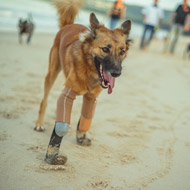
Blades are similar to those used by Paralympian sprinters
A dog from Thailand has become the first in the world to receive a pair of prosthetic legs with blades, similar to those used by Paralympic sprinters.
Cola was just a puppy when he was presented to the Soi Dog Foundation suffering from severe leg injuries. After chewing on his neighbour’s shoes, the neighbour was so enraged that he slashed Cola’s front legs with a sword.
On hearing Cola’s story, Soi Dog founder Gill Daley felt an immediate affinity with the puppy. She herself had lost both legs after contracting septicaemia and was fitted with prosthetics by Bengt Soderberg, owner of the Scandinavian Orthopedic Laboratory in Phuket.
Gill approached Bengt to see if he might be able to help Cola. When she mentioned to him that she has a dog who had also lost his front legs, he was more than happy to oblige.
Bengt first fitted Cola with a pair of fibreglass extensions. But because they were heavy and had no bounce, he set about inventing extensions based on Paralympian blades.
“Cola is the first dog I have made bilateral legs for and we have been tweaking the prosthetics so that they don’t bother him, or at least to keep the disturbance to a minimum,” he explained.
“The new legs took about a year to create and are very similar to what professional athletes use in the Paralympics. We used the same carbon fibre, same structure and same suspension.
“This provides Cola with maximum flexibility combined with low weight, allowing him to run and play like the other dogs do.”
Within minutes of having the blades fitted, Cola was jogging up and down the beach with his friends.
Sadly, Gill died in February this year before Cola got his new legs. But her husband John said: “We are so happy to see Cola running with his new legs. Dogs certainly learn how to use prosthetics faster than humans do, and it is great to see him play and run like the other dogs.”
He continued: “He was just six months old when his terrible ordeal happened. Like a lot of puppies, he liked to chew things that were lying around, including the neighbour’s boots.
“The neighbour complained to Cola’s owner, who offered to compensate him for the damage. But it seems that the neighbour wasn’t satisfied with the offer. He came back that night and hacked off Cola’s front legs, using a sword.”
Image (C) Soi Dog Foundation



 The Veterinary Medicines Directorate (VMD) is inviting applications from veterinary students to attend a one-week extramural studies (EMS) placement in July 2026.
The Veterinary Medicines Directorate (VMD) is inviting applications from veterinary students to attend a one-week extramural studies (EMS) placement in July 2026.